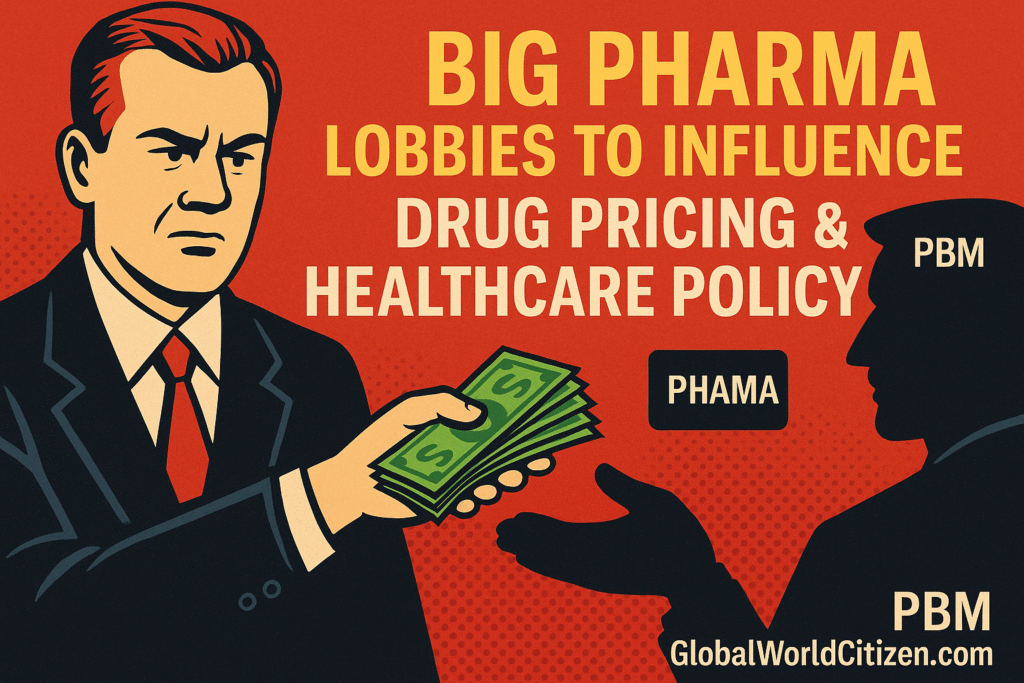Published Date: April 30, 2025 ✍️ Author: Global Health & Economic Power Desk 🌐 Source: GlobalWorldCitizen.com
In the latest front of the global healthcare affordability crisis, Big Pharma has seized control of the drug pricing narrative, launching an aggressive political and media campaign to deflect blame from high prescription prices and redirect scrutiny onto pharmacy benefit managers (PBMs).
Following a new executive order from President Trump calling for a full review of PBM practices, pharmaceutical giants have declared victory in a long-running war over public perception and healthcare policy. Backed by record-breaking lobbying expenditures, the pharmaceutical industry’s influence in Washington is reshaping not only U.S. healthcare regulation—but also global access to medicine.
 Big Pharma’s Lobbying Machine: Record Spending, Strategic Targeting
Big Pharma’s Lobbying Machine: Record Spending, Strategic Targeting
According to newly released federal data:
$31 million was spent by pharmaceutical companies on lobbying efforts in 2024
An additional $13 million was spent in Q1 2025 alone, much of it focused on targeting PBMs like those under CVS Health and UnitedHealth Group
The industry’s main lobbying arm, PhRMA, is aggressively pushing its message through:
Sponsored nonprofit partnerships
Media advertising and paid op-eds
Sponsored podcasts and influencer campaigns
Political donations and private events with key policymakers
The result: PBMs are now positioned as the primary villains in the public debate over rising drug costs.
 PBMs vs. Pharma: The Battle for the Drug Price Narrative
PBMs vs. Pharma: The Battle for the Drug Price Narrative
 What Are PBMs?
What Are PBMs?
Pharmacy Benefit Managers (PBMs) are middlemen who negotiate prices between drug manufacturers and insurers. They claim to save patients money by negotiating bulk discounts.
 Big Pharma’s Claim:
Big Pharma’s Claim:
Pharmaceutical companies argue PBMs pocket up to 80% of the negotiated savings, leading to higher out-of-pocket costs for patients.
 PBMs Fight Back:
PBMs Fight Back:
PBMs counter that drugmakers set the initial list prices, and PBMs merely negotiate within an inflated pricing system created by the pharma industry.
In reality, both sides benefit from opacity—while global citizens, patients, and healthcare systems bear the cost.
 Global Implications: Healthcare Inequality and Policy Manipulation
Global Implications: Healthcare Inequality and Policy Manipulation
This lobbying war is not just an American policy battle—it reflects deeper concerns about global healthcare equity, corporate influence, and the privatization of public health systems.
 Key Issues Affecting Global Citizens:
Key Issues Affecting Global Citizens:
Access to affordable medicine is being shaped by corporate lobbying, not public need
Pharmaceutical giants fund both sides of the debate—supporting Black and Latino advocacy groups, as well as conservative think tanks
Communities of color and vulnerable populations are being used as political leverage in a high-stakes policy war
With Medicare drug price negotiations delayed and bipartisan support for PBM investigations growing, Big Pharma’s strategy is working.
 GlobalWorldCitizen.com Key Takeaways
GlobalWorldCitizen.com Key Takeaways
 1. Big Pharma’s Lobbying Blitz Is Redefining Healthcare Politics
1. Big Pharma’s Lobbying Blitz Is Redefining Healthcare Politics
Over $44 million spent in 15 months to frame PBMs as the root of drug pricing problems
Trump’s executive order signals the depth of industry influence over federal healthcare policy
 2. The PBM–Pharma War Distracts from Real Reform
2. The PBM–Pharma War Distracts from Real Reform
Each side blames the other while patients pay more and reforms stall
Neither model guarantees transparency, affordability, or equitable access
 3. Global Drug Access Is at Risk
3. Global Drug Access Is at Risk
As U.S. policy trends shift, developing nations may see medicine costs rise
Global negotiations on vaccine pricing, generics, and IP rights are increasingly influenced by U.S. industry lobbying
 Final Word from GlobalWorldCitizen.com
Final Word from GlobalWorldCitizen.com
The battle between Big Pharma and PBMs is a cautionary tale for global world citizens, health advocates, and policy reformers. It exposes how corporate lobbying, media control, and political influence can derail public health priorities and hijack reform.
At GlobalWorldCitizen.com, we will continue reporting on:
Global drug pricing trends
Pharmaceutical lobbying and health equity
The future of U.S. and global healthcare reform
Healthcare isn’t just about medicine—it’s about power. And that power is being negotiated behind closed doors, while billions of people wait for affordable access to life-saving drugs.

